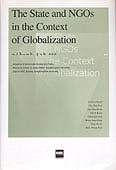| |
|
|
|
 |
 |
 |
| |
 |

|
|
The State and NGOs in the Context of Globalization
|
 |
조희연 편
한울아카데미 / 2002-08-28 발행 / 신국판 / 양장 / 207면 / 20,000원
ISBN 89-460-2975-7 93330
분야 : 정치·국제관계, 행정·지역개발, 사회학
|
|
 |
|
|
 |
| |
 |
 |
 |
| |
이 책은 2001년 11월 성공회대 NGO학과, 아시아NGO정보센터와 민주사회정책연구원(상지대·성공회대·한신대 합동연구소)이 공동으로 주최한 한독학술대회 심포지움의 결과를 보완하여 책으로 묶은 것이다. 이 책에 실린 논문들은 "세계화·국가·NGO"라는 주제를 여러 측면에서 분석한 것이며 전문 영문으로 수록되어 있다. |
|
 |
| |
<영문 차례>
Part 1: The State and NGOs in the Context of Globalization
1. The Democratic Potential of Non-Governmental Organizations
2. Global Neo-liberalism, Democratic Transition and NGO
Part 2: NGOs as a Progressive Actor in World Politics
3. NGOs as Global Actor: Myth or Reality?
4. NGOs as a Progressive Actor in World Politics?
Part 3: NGOs and State in the Regulation of Environmental Problems; On the way to a Post-fordist mode of regulation
5. NGOs and State in the Regulation of Environmental Problems: On the way to a Post-fordist Mode of Regulation?
6. The Transportation of Taiwan"s Nuclear Waste into North Korea: Dynamics between Transnational Civil Society"s Politics and International Regimes
Part 4: NGOs, State and Civil Society; On the Transformation of Hegemony
7. Lagged Democratic Consolidation and the Role of Social Movement; The Case of Naksun Movement in South Korea (Ho-Ki Kim& Dr. Kim Young Bum)
<우리말 차례>
제1부. 세계화의 맥락 속에서의 국가와 NGO
1. 글로벌 체제 속에서의 NGO의 민주적 잠재력
2. 글로벌 신자유주의, 민주주의 이행과 NGO
제2부. 국제정치에서 진보적 행위자로서의 NGO
3. 글로벌 행위자로서의 NGO: 신화인가 실제인가.
4. 국제정치에서 NGO는 진보적 행위자인가?
제3부. 글로벌 환경문제 해결에서의 국가와 NGO
5. 환경문제의 조절에 있어서의 국가와 NGO: 포스트 포디즘적 조절양식으로 가는 길?
제4부. 국가, 시민사회, NGO
6. 민주주의 공고화의 지체와 사회운동의 역할 |
|
|
|
|
| |
|
|
|
|

